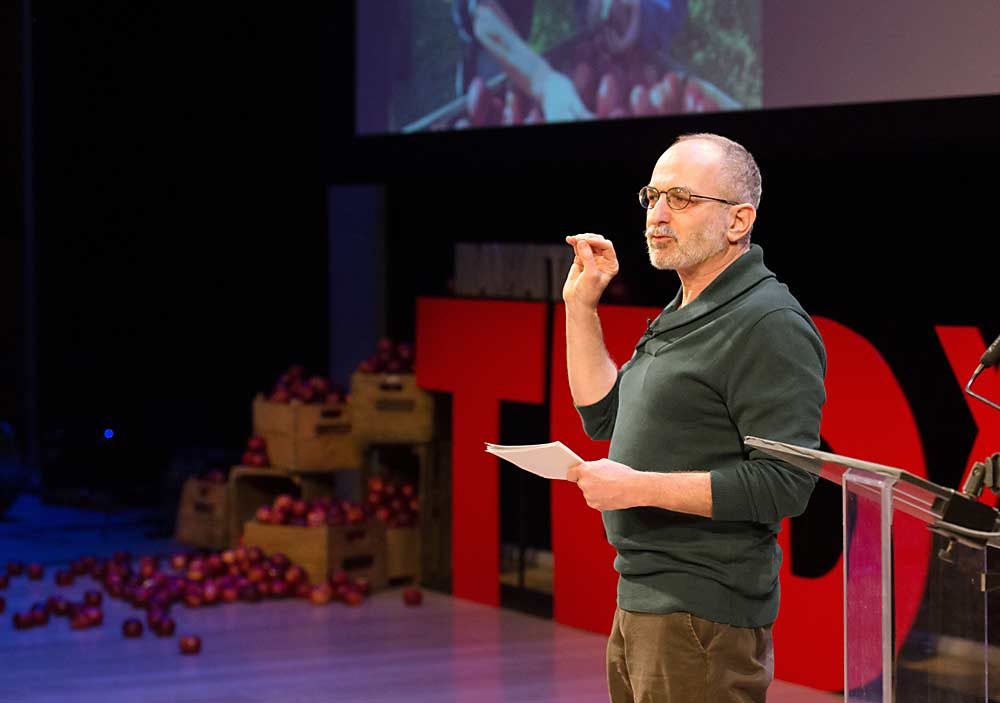
Farmers know that food can be grown safely, sustainably and conscientiously without being certified organic, but that idea hasn’t penetrated the mind of the average consumer. Some consumers still believe that if the label doesn’t say “organic,” it must not be safe.
Michael Rozyne spent years fighting that misconception before he realized he was going about it the wrong way.
“It’s so hard to get through to an ordinary American shopper in a way they can understand,” he said. “Years of frustration trying to improve (my messaging) led me to realize this is not about our own lack of expertise. This is about the brain.”
Rozyne will discuss bridging the information gap between farmers and the general public during the 2019 Great Lakes Fruit, Vegetable & Farm Market EXPO, held Dec. 10–12 in Grand Rapids, Michigan. Rozyne is scheduled to speak during the Tuesday morning (Dec. 10) tree fruit session.
He founded Red Tomato in 1996, a nonprofit food hub based in Plainville, Massachusetts, that markets fruits and vegetables from dozens of Northeast farms to local supermarkets.
Growers who follow the food hub’s Eco Apple or Eco Peach certification programs use ecologically friendly and sustainable growing practices and follow a rigorous integrated pest management (IPM) protocol. But Rozyne discovered early on that most consumers do not understand integrated pest management. And no matter how hard he tried, he could not make them understand.
“Most shoppers believe ‘good’ equals ‘unsprayed,’ or that ‘natural’ means nothing applied or nothing sprayed,” Rozyne said. “The idea of responsible pest management … it’s almost not an idea.”
He can’t blame consumers for being bewildered.
“I completely understand why shoppers are confused about all this stuff,” Rozyne said. “There are different perspectives aiming so much information at them.”
Misinformation and misconceptions are a common problem throughout the world of agriculture, he said, and solutions cannot be found within agricultural science. So, he turned to social science for help.
He studied the concept of “framing” and learned more from the FrameWorks Institute, a Washington, D.C.-based think tank composed of social scientists who specialize in translating scientific views to the public.
“Our brains interpret the world we live in through thousands of frames we have inside of our head all the time,” Rozyne said. “When we hear a particular word, it activates the existing frame, which helps us interpret the data.”
This perspective helped him to see that consumers lack the proper frames to understand the nuances of modern farming. To figure out how to create those frames, Red Tomato partnered with FrameWorks and IPM Voice, a group that advocates for IPM practices, to create the Farming and Food Narrative Project.
The five-year project, started in 2016, uses cognitive science to attempt to reframe the public narrative about food and farming. The final “tool kit” — practical messaging the industry can use to educate consumers — will not be created until the last phase of the project, but they’ve already learned some valuable lessons, Rozyne said.
Using FrameWorks’ Strategic Frame Analysis, the project surveyed 17 agricultural experts, asking them open-ended questions about farming, its challenges and what society can do to support best practices. The next step was to survey a representative sample of the public to understand what shoppers think about the same topics.
Analyzing the gap between the two groups was “pretty darn interesting,” Rozyne said. For example, when asked about soil health, the experts replied with complexity and a sense that soil health is a “foundational idea.” The public, on the other hand, has almost no concept of the importance of soil health.
When asked about sustainability, the experts approached it from multiple angles: environmental, social, economic. The public, on the other hand, responded with something between confusion or not thinking about it at all.
“The experts are saying this is really important stuff. The public is saying, ‘sorry, it’s not in my brain,’” Rozyne said. “You can’t get new data into somebody’s mind if they don’t have active frames already on that subject. Therein lies the huge challenge.”
The next stage of the project will be using what they’ve learned to create a narrative — a narrative that, they hope, can bridge the communication gap, said Larry Gut, a professor and extension specialist with Michigan State University.
Gut serves on the Farming and Food Narrative Project’s leadership team, and he has been advocating for more effective messaging for a long time. As a leader of IPM Voice, he was one of the people who pushed that group to go deeper than just explaining IPM practices.
“We said we’re not going to communicate with the public about IPM until we can communicate with the public about farming,” Gut said. “A lot of misconceptions about farming need to be tackled first.”
Though his focus has been tree fruit entomology, Gut described the Farming and Food Narrative Project as the “most important project I’ve done in my career.” There’s a fundamental need to reframe how the public thinks about farming, he said, and to assure them that their food is safe and healthy.
Gut said the Great Lakes EXPO audience might learn some eye-opening lessons about the ways the public perceives farming. He’s seen a few eye-openers himself.
“I was surprised to find that the public values farming and sees it as challenging, but they think it’s relatively simple work,” he said. “They don’t appreciate the complexity.”
For example, the public thinks there’s a lot of manual labor involved in farming, but not a lot of mental labor.
“I found that amazing,” Gut said. “But it’s what we have to know in order to communicate with them.” •
—by Matt Milkovich






Leave A Comment